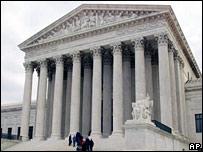| The prisoners whose
names have gone forward in these test cases are Lakhdar
Boumediene and Fawzi al-Odah.
The first is an Algerian turned Bosnian who went to Bosnia during the civil war and stayed on. He was arrested on suspicion of planning an attack on the US embassy there but was released and then, according to his lawyers, grabbed by US agents and secretly flown to Guantanamo Bay. The second is a teacher from Kuwait who was picked up in Pakistan. A 17th Century example
Clarendon sent prisoners out of England and held them without trial
However another, more ghostly, figure will also feature in the case.
This is Edward Hyde, Earl of Clarendon, who was one of Charles II's henchmen after the restoration of the monarchy in England in the 17th Century. Briefs for both sides in the Supreme Court hearing mention his activities. Clarendon set up his own Guantanamo Bay, believed to have been in Jersey, in the hope that his prisoners could be kept away from the courts and in particular from the right of habeas corpus. This is an ancient procedure in which a court can order someone holding a prisoner to bring him or her to court to justify the detention. In the end, he failed and was himself impeached before fleeing abroad. The administration had hoped, too, that, by choosing a remote location in Cuba, it would avoid the scrutiny of American courts. However, in an important case called Rasul v Bush in 2004, the Supreme Court held that prisoners, even though foreign and even though in a far away place, could petition US courts under habeas corpus. So to try to get around this, in 2006 the administration proposed, and Congress passed, the Military Commissions Act (MCA). This removed the habeas corpus right. And it is this Act which is being challenged in the Supreme Court. Arguments for the prisoners Lawyers for the petitioners (that is the prisoners) argue in their brief: "The Founders of our nation created a Constitution dedicated to the protection of liberty, not one that turns a blind eye to indefinite detention without a meaningful opportunity to be heard." They say that habeas corpus does extend to Guantanamo Bay because, even though the territory is not under formal US sovereignty, it is under US control. "The MCA's purported repeal of habeas is unconstitutional," they argue. Arguments for the government US government lawyers under the solicitor general, who argues government cases in the court, have responded by saying in their brief that the US does not own Guantanamo Bay and therefore the writ of habeas corpus does not run there.
The government further argues: "The Military Commissions Act of 2006 validly divested the District Court of jurisdiction over petitioners' habeas corpus petitions." Dazzling display The arguments will be heard in a one-hour session during which the justices of the Supreme Court pepper and interrupt the lawyers with questions designed to test them and trip them up. It is often a dazzlingly learned hearing and the lawyers for both sides have to be wary of making mistakes and of being found ignorant and wanting. The court then issues its ruling some months later. In this case, the stakes are higher than usual - the future of Guantanamo Bay. The Earl of Clarendon would be fascinated. Paul.Reynolds-INTERNET@bbc.co.uk |

